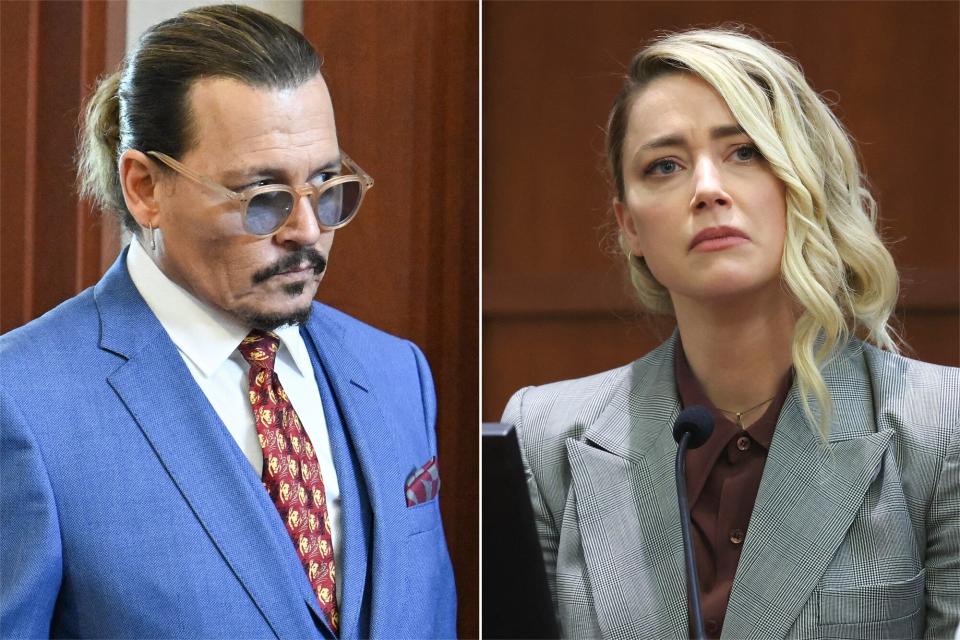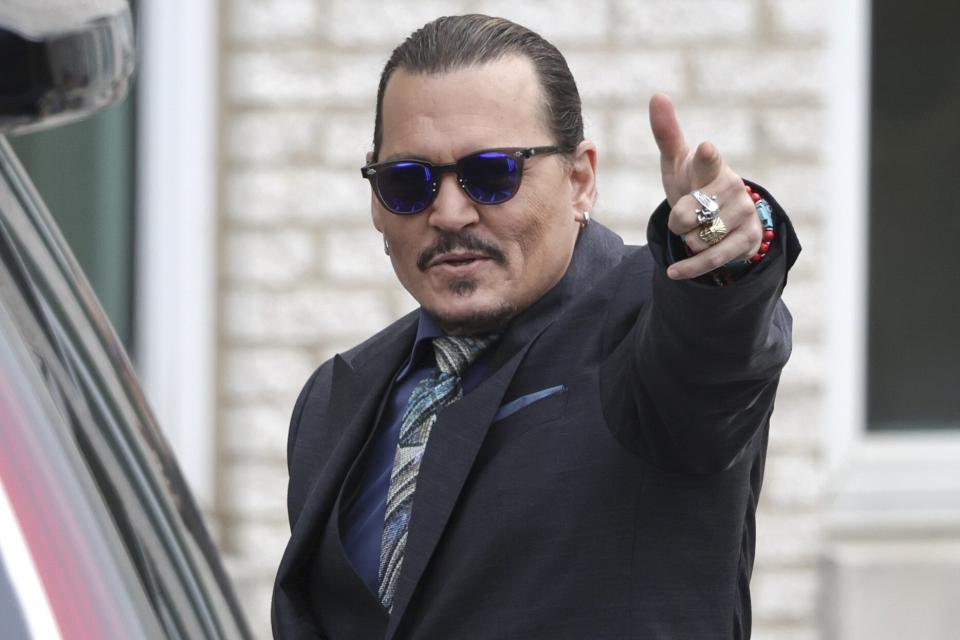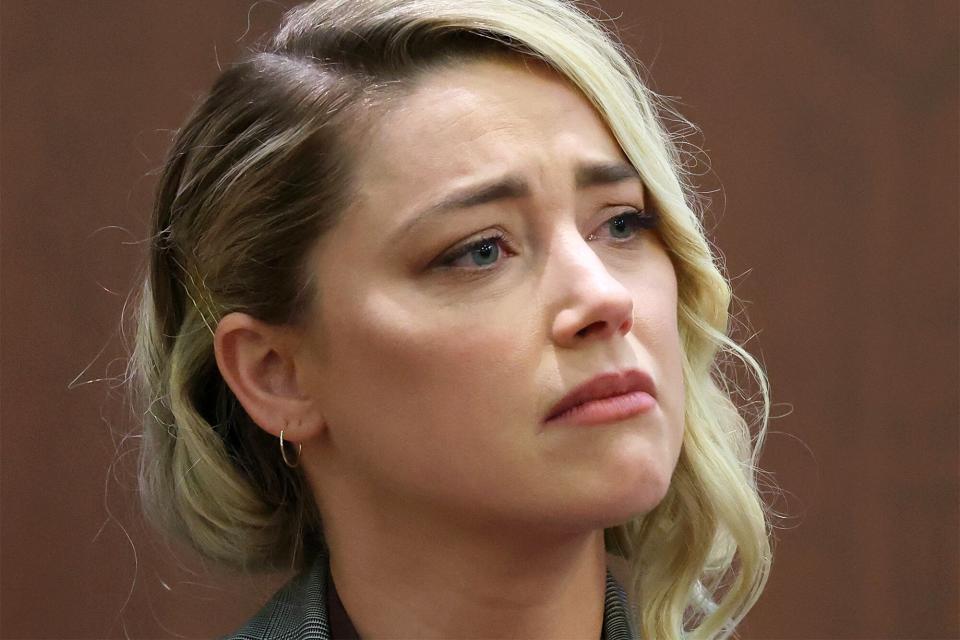Johnny Depp v. Amber Heard: Legal experts break down the verdict, appeal chances, and what's next

- Oops!Something went wrong.Please try again later.
- Oops!Something went wrong.Please try again later.
The show is finally over, folks, and while Johnny Depp emerged victorious over his ex-wife Amber Heard, for the millions of trial spectators around the world there's still a laundry list of lingering questions about what the hell we all just witnessed.
In case you somehow missed it, Depp sued Heard over a Washington Post op-ed she wrote in 2018, which chronicled her experiences as a domestic violence survivor but never mentioned Depp by name. Heard filed her own countersuit, alleging that Depp and his legal team defamed her by calling her allegations a hoax.
On Wednesday, a Fairfax County, Va., jury agreed with Depp that Heard intentionally and maliciously defamed him by writing the op-ed, awarding the actor $10 million in compensatory damages and $5 million in punitive damages. Judge Penney Azcarate reduced the punitive damages to Virginia's statutory cap of $350,000. The jury also found partly in Heard's favor with regard to her defamation countersuit, awarding her $2 million in compensatory damages and no punitive damages.
So how surprising is this verdict, especially given that Depp lost his 2018 libel suit against The Sun, with a U.K. judge finding the majority of Heard's abuse accusations against him credible? Heard is already eyeing an appeal, but what are the chances she actually goes through with it? If she does, would she even have a shot at winning? And perhaps most importantly, what are the wider implications of this verdict, and how could it impact other survivors' willingness to come forward?
EW enlisted two legal experts — Valentina Shaknes, a founding partner of matrimonial law firm Krauss Shaknes Tallentire & Messeri LLP with expertise in domestic abuse and complex marital matters, and former assistant U.S. attorney Neama Rahmani — to help answer these and more burning questions about the case. (Interviews were conducted separately and combined.)

JIM WATSON/POOL/AFP via Getty Images; MICHAEL REYNOLDS/POOL/AFP via Getty Images Johnny Depp and Amber Heard
ENTERTAINMENT WEEKLY: Were you surprised by the verdict?
NEAMA RAHMANI: It was surprising. Now, it certainly wasn't surprising that he won after their testimony because Johnny Depp was probably one of the best witnesses I've ever seen on the stand. Depp was likable, he was credible, and Heard was not. I think the jurors saw through that and they punished her as a result.
VALENTINA SHAKNES: I was surprised. It sort of took me a minute to figure out how they both could be awarded damages; how they both could be right. Neither of them got the full amount of the damages they were suing for, but they both got compensatory, partial compensatory damages. And then of course on top of that, Johnny got punitive damages. They were reduced in accordance with the statutory maximum, but still, the jury awarded him 50 percent of the amount of the compensatory damages they awarded. So yes, I was surprised by the results.
What were some of the factors that made Heard appear not credible?
NR: Let's talk about Heard's testimony. She testified that she thought Depp was going to kill her. She testified that Depp hit her so many times that she lost count. The pictures and videos she showed the jury and she showed the entire world do not match her description of the injuries. She described an attempted murder, a felony assault. What we saw at best was a misdemeanor battery.
The other issue was that Heard accepted no responsibility for what happened. The jurors heard her on video and audio being verbally abusive. Witnesses testified too, saying that this was a mutually toxic relationship. But what did Amber say? She said she only hit Johnny once during that infamous staircase incident. I don't know if it was narcissism. I don't know if it was bad legal advice. I don't know if it was her PR team that didn't want her to admit anything, or her just being overconfident after the victory in the U.K., but it was clear that it was a mistake for her to take such an extreme position when a more nuanced approach may have been a path to victory for her.
VS: I think that two things happened here: One, Johnny was able to tell a more coherent, more credible, more believable story. And then on top of that, he has other external witnesses and other information that was able to sort of confirm different portions of his testimony. So overall, he was more credible. The jury found him more believable. Is there one piece of evidence that the jury found so compelling? I seriously doubt it. I'm absolutely convinced that it's a cumulative impact of all of the evidence during this more than six-week trial.
What made Depp's defense stronger than Heard's?
NR: If you want to boil it down to two factors: credibility and likability. Johnny was one of the most likable witnesses I've ever seen on the witness stand in my 20 years of practice. The jurors loved him. The public loved him. Everyone on social media loved him. He was vulnerable; he talked about his abuse at the hands of his parents, and his struggles with substance abuse starting at age 11. Really, aside from maybe the text messages that he discussed during his rebuttal, I thought he was honest about everything. Whereas Amber didn't admit anything and seemed to lie about even unnecessary facts.
Had she just been honest and said, "I was planning to donate the 7 million to charity, but I had to pay these lawyers. They're expensive. I was embarrassed. I made this promise. I was unable to fulfill it," the jurors maybe would have found her credible. Compare that to Johnny, who admitted to saying that he wanted to have sex with his ex-wife's corpse. He said he was upset and was venting to a friend. I think Amber's was an unlikable witness, and the jurors weren't going to side with her and punished her as a result.
VS: Kate Moss' testimony was significant because she was someone Amber alluded to as an example of why she needed to exercise self-defense. So I think it was quite impactful that Moss came out and said, "Well, no, I was never pushed down the stairs." I also think it was impactful that Johnny is in his late 50s, and this is a relatively short relationship that he had later in his life, after many decades of being in the public eye and multiple relationships. And there wasn't really anyone else jumping to testify against him to say, "Yeah, he was also abusive to me during our marriage or during our relationship."
So I think it's the cumulative impact of all of that. It's not so different from the court of public opinion. It seems that Johnny did way better in public opinion and was doing way better from the very beginning of the trial.

Kevin Dietsch/Getty Johnny Depp
Depp asked for $50 million and got $15 million, what does that say?
NR: The damages in this case, especially for Amber Heard, were highly speculative. And the reason is these aren't W-2 employees that missed two months of work so it's easy to calculate their lost income. Depp testified that he missed out on Pirates 6 because of the op-ed. Well, the Disney witness said that the decision not to cast him had nothing to do with the op-ed. They didn't even know about it. So for parties like this, entertainers where their lost income is unclear, it's tougher for them to prove their damages. And that being said, a $10 million compensatory verdict, that's pretty significant. That's a lot of money. Some jurors don't even award that much in wrongful death cases, so it's really a complete and total win for Depp, even though he asked for 50.
The jury was composed of five men and two women. Do you think this could have factored into the decision?
NR: I mean, the conventional wisdom is that women tend to be harder on women when it comes to allegations of domestic violence and sexual abuse. That's why whether it's Weinstein or Cosby, the defense in those cases wanted women. It's not the case that men tend to punish women. It's actually women that tend to punish women because it's just women, they say, "Well, I wouldn't have put myself in that situation," if they're an older, more conservative juror, or maybe women know someone who's lied and they've fabricated allegation. It's not a hard and fast rule, but generally speaking, it's not always the case where if you're a female accuser, you want other women on the jury.
VS: If I were on Amber's legal team, I would've absolutely wanted at least three or four or five members of the jury to be female. I would want as many women on the jury as possible. But we actually don't know if maybe the two women were much more pro-Johnny than the five men. There's no way for us to know. But there's certainly a perception of bias. And given the outcome, I think that the makeup of the jury is, let's say, unfortunate because it leaves room for this kind of questioning and guesswork.
How do you think this will impact people, namely women, coming forward?
VS: I think you have to look at it in a broader setting. There was a time in our history when women were not given an opportunity to make an accusation; where they were not given a fair trial; when the crimes reported by women, even criminal crimes, were offhandedly dismissed by the police, not investigated, not reported to the district attorneys.
In this situation, Amber was given as many opportunities as Johnny was. This was a six-week trial where both were given time to testify and present evidence. And I think if we accept the legal process, as we should, then what we come out with is that the jury, after having heard all of this evidence, found that Amber was not credible.
So should you extrapolate from that the future of all other women victims coming forward and accusing powerful men, and can we conclude that they are all not going to be believed? No, I don't think so at all. And actually, I think what we see from this is that, and I think hopefully what we can take from this, is that future accusers will be given the same kind of benefit and access to the legal system, the time, the legal resources, etc., that Amber has. And then it's up to the victims and to the accusers.
NR: It's certainly the beginning of the accused going after their accusers. We saw this a little bit with former President Trump, who used defamation lawsuits to go after his political opponents. Many times, the accused, they're rich and powerful men. They're going to file lawsuits against their accusers, put them on defense, and make them spend hundreds of thousands or millions defending themselves. They have the money to file these lawsuits, and oftentimes the women accusers do not. Now, is the best defense a good offense, especially when sexual assault and domestic violence are two of the most underreported crimes in this country? Is this going to have a chilling effect on actual victims coming forward? Yeah, potentially.

MICHAEL REYNOLDS/POOL/AFP via Getty Images Amber Heard
Can Heard appeal, and how does that work?
NR: She can appeal, but you generally can't appeal a factual finding, and the jury found that she lied and that she acted with malice. You can only appeal a legal error. As a 20-year trial lawyer, the judge called it pretty fairly. I can't think of one clear legal error that was made in this case.
VS: I think pretty explicit and inherent in the jury's decision [Wednesday] is that they found Johnny more credible than Amber, and they found his account more credible than Amber's. And the issues of credibility are really reserved to the purview of the juries and appellate divisions. Appellate courts are very, very reluctant to do a reassessment of credibility findings. One issue they could try to appeal is the amount of the damages if that is somehow in conflict with the law.
What are her chances on appeal?
VS: I think it would be extremely hard and unlikely to win were they to try and appeal the underlying findings, given that they're so credibility-based.
NR: Yeah, I think the chances would be slim on appeal, but let's talk more about the appeal: When you appeal, interest starts accruing. In most states, it's high. So Amber cannot discharge the judgment in bankruptcy because Depp proved that Heard acted with malice. Intentional torts or intentional acts aren't dischargeable in bankruptcy. So that jury finding is important. And in Virginia, the judgment lasts for 10 years and it's automatically renewable for two additional 10-year terms, so 30 years total. So Johnny can conceivably go after Amber for 30 years and garnish her wages and levy her bank accounts and attach her real estate property to try to get paid.
The also jury found that Depp, via his lawyer, defamed Heard by calling her allegations a hoax. But since the jury didn't find her abuse claims credible, why was it defamatory for Depp's lawyers to accuse her of a hoax?
VS: The best way to translate it is that I think the jury wanted to give Amber something.
NR: The only lie that Heard's team was able to prove to the jury, that one counterclaim, was that [Adam Waldman, Depp's lawyer] lied when he said that Heard and her friends set Depp up and perpetuated a hoax when they called the LAPD to the apartment in 2016. Well, the evidence revealed that Heard didn't call LAPD. The call came from someone in New York. So to the extent that Waldman said Heard was responsible for that when Heard didn't even cooperate with LAPD when they showed up, I think the jurors analyzed that scene, that interaction with LAPD, and said, "You know what? It wasn't a hoax. It wasn't a setup because if it was, maybe Heard would've called herself or maybe she would've talked to LAPD, and she chose not to do so."
This Q&A has been edited for length and clarity.
Related content:

